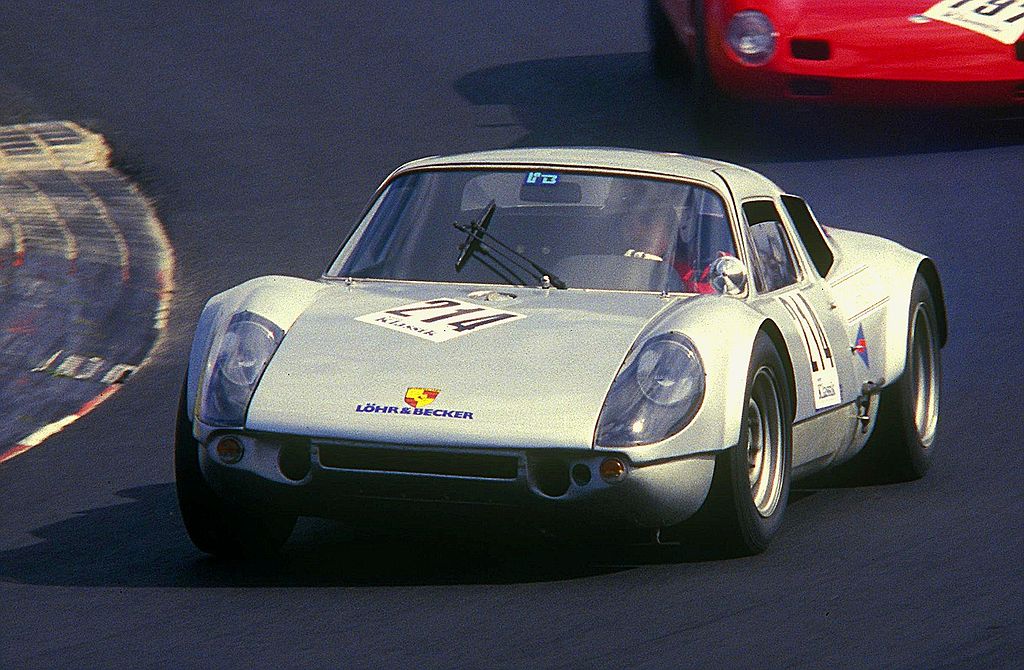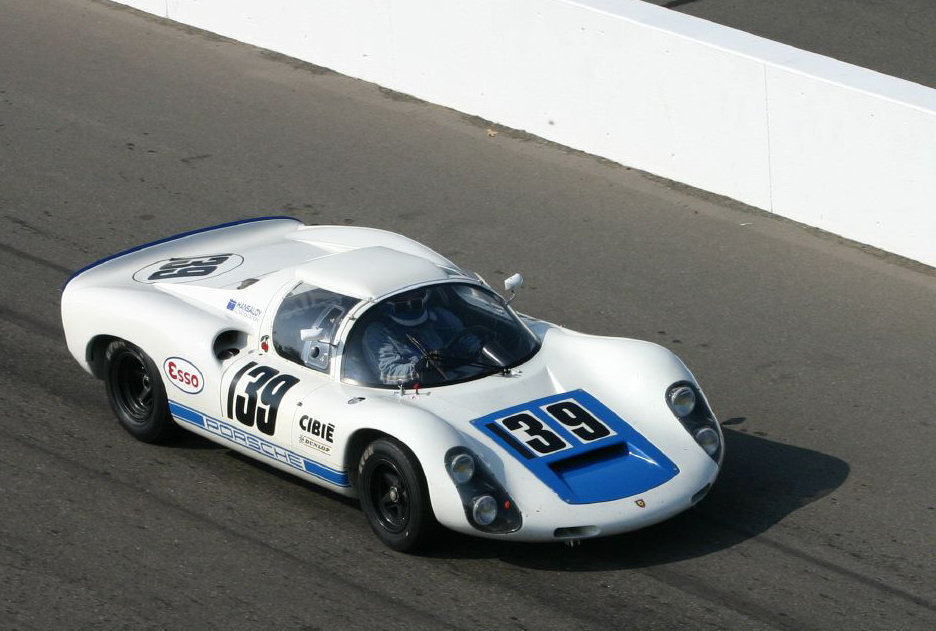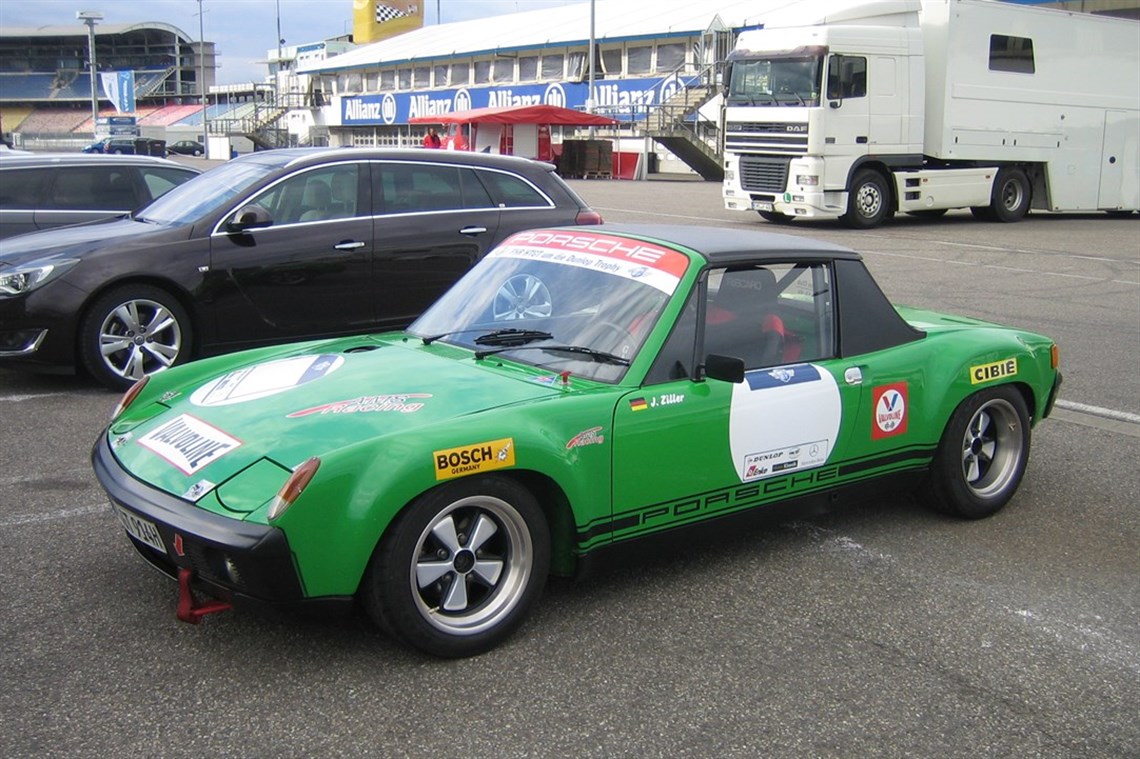Porsche 550
The Porsche 550 was a racing sports car produced by Porsche from 1953-1956.
Porsche 718
The Porsche 718 is a racing car built by Porsche between 1957 and 1962.
Porsche 787
The Porsche 787 was a Formula Two racing car built in 1960, based on the 1500 RS-K race sports car.
Porsche 904
The Porsche 904 is an automobile which was produced by Porsche in Germany in 1964 and 1965. It was officially called Porsche Carrera GTS due to the same naming rights problem that required renaming the Porsche 901 to Porsche 911.
Porsche 906
The Porsche 906 or Carrera 6 was a street-legal racing car from Porsche. It was announced in January 1966 and 50 examples were subsequently produced, thus meeting the homologation requirements of the FIA's new Group 4 Sports Car category to the letter. The type would also compete in modified form in the Group 6 Sports Prototype class.
Porsche 907
The Porsche 907 was a sportscar racing prototype built by Porsche in 1967 and 1968.
Porsche 908
The Porsche 908 was a racing car from Porsche, introduced in 1968 to continue the Porsche 906/Porsche 910/Porsche 907 series of models designed under Ferdinand Piech.
Porsche 909 Bergspyder
The Porsche 909 "Bergspyder" was a spyder sports car designed and built by Porsche in 1968 specifically for competing in hillclimbing competitions. It was a short lived model, but its basic design went on to become the successful 908/3.
Porsche 910
The Porsche 910 or Carrera 10 was a race car from Porsche, based upon the Porsche 906. 29 were produced and entered in 1966 and 1967. The factory name for the 910 was the 906/10. The 910 was considered the next sequence in the 906 line.
Porsche 911 GT1
The Porsche 911 GT1 was a car designed for competition in the GT1 class of sportscar racing, which also required a street legal version for homologation purposes. The limited-production street-legal version was labeled the 911 GT1 Straßenversion (Street version).
Porsche 911 GT3
The Porsche 911 GT3 is a high performance version of the Porsche 911 sports car primarily intended for racing. It is a line of high-performance models, which began with the 1973 911 Carrera RS. The GT3, introduced in 1999, is named after the Fédération Internationale de l'Automobile (FIA) Group GT3 class, in which it was designed to compete.
Porsche 914-6 GT
The Porsche 914-6 GT was a race car built by Porsche, based on the 914 model with a 6-cylinder engine and GT package.
Porsche 917
The Porsche 917 is a sports prototype race car developed by German manufacturer Porsche. The 917 gave Porsche its first overall wins at the 24 Hours of Le Mans in 1970 and 1971. Powered by the Type 912 flat-12 engine of 4.5, 4.9, or 5 litres, the 917/30 Can-Am variant was capable of a 0-62 mph (100 km/h) time of 2.3 seconds, 0–124 mph (200 km/h) in 5.3 seconds, and a test track top speed of up to 240 mph (390 km/h). The highest official speed ever clocked for a 917 at Le Mans is 362 km/h or 224.4 mph
Porsche 919 Hybrid
The Porsche 919 Hybrid is a sports-prototype racing car constructed by the German car manufacturer Porsche for use in the Le Mans Prototype 1-Hybrid (LMP1-H) category of the FIA World Endurance Championship for factory-supported hybrid-powered cars. It is the first sports-prototype built by Porsche since the RS Spyder, the first sports-prototype built by Porsche to compete in a top category of sportscar racing since the Porsche 911 GT1-98 and Porsche LMP1-98 and the first sports-prototype to be raced by Porsche as a racing team since the Porsche 911 GT1-98 and Porsche LMP1-98. It uses a 2.0 L four-cylinder turbocharged engine with a battery-based hybrid system.The car made its competitive debut at the 2014 6 Hours of Silverstone, the opening round of the 2014 season. The 919 Hybrid project is scheduled to be discontinued at the end of the 2017 season to allow Porsche to focus on entering Formula E.
Porsche 934
The Porsche 934 was a racing version of the Porsche 911 Turbo, prepared to FIA Group 4 rules, similar to the Porsche 935 which was prepared to FIA Group 5 rules.
Porsche 934/5
The Porsche 934/5 is a 1977 racing car that was designed as a hybrid of the Porsche 934 and Porsche 935 to compete in Racing Group 4 of the IMSA.
Porsche 935
The Porsche 935 was a race car made by German automaker Porsche. Introduced in 1976 as the factory racing version of the Porsche 911 turbo prepared for FIA-Group 5 rules, it was an evolution of the Porsche Carrera RSR 2.1 turbo prototype, the second place overall finisher in the 1974 24 Hours of Le Mans.
Porsche 936
The Porsche 936 was a Group 6 Two-Seater Racing Car introduced in 1976 by Porsche as a delayed successor to the 917, a five litre Group 5 Sports Car, and the 908, a three litre Group 6 Prototype-Sports Car, both of which were retired by the factory after 1971. Its name came from using a variant of the Porsche 930's turbocharged engine, as well as competing in Group 6 racing.
Porsche 953
The Porsche 953 was a heavily modified variant of the 911, designed and built specifically to compete in the 1984 Paris–Dakar Rally. It was a short lived model, as it was replaced in 1985 by the 959. It is sometimes referred to as the 911 4x4, as it used the developmental, manually controlled four-wheel drive system that was intended to be used on the 959. Travelling on an extremely enhanced suspension, powered by a 300 bhp (220 kW), 6-cylinder engine, and weighing in at 2,750 lb (1,247 kg), it was extremely successful. Three of them were entered into the Paris-Dakar Rally, one taking overall first place.
Porsche 956
The Porsche 956 was a Group C sports-prototype racing car designed by Norbert Singer and built by Porsche in 1982 for the FIA World Sportscar Championship. It was later upgraded to the 956B in 1984. Driven by Stefan Bellof in 1983, this car holds the all-time record for the fastest vehicle ever to lap the famed Nürburgring Nordschleife, completing the 20.832 km (12.93 mi) circuit in 6:11.13 during qualifying for the 1000 km Sports Car race.
Porsche 961
The Porsche 961 was a racing car built by Porsche and based on their 959 sports car. It was intended for Group B sports car racing, complementing the purpose-built 956 and 962C which ran Group C in the World Sports-Prototype Championship. The 961 project was short lived, running only three races and seeing the construction of only one car. Plans to sell the car to customers were scrapped when the Group B class was canceled.
Porsche 962
The Porsche 962 (also known as the 962C in its Group C form) is a sports-prototype racing car built by Porsche as a replacement for the 956 and designed mainly to comply with IMSA's GTP regulations, although it would later compete in the European Group C formula as the 956 had. The 962 was introduced at the end of 1984, from which it quickly became successful through private owners while having a remarkably long-lived career, with some examples still proving competitive into the mid-1990s. The vehicle was later replaced by the Porsche WSC-95.
Porsche LMP2000
The Porsche LMP2000 (also known as the Porsche 9R3) was a Le Mans Prototype racing car that was developed between 1998 and 2000, but never raced. One car was built, and it was designed around a modified version of Porsche's 3.5-litre V10 engine that was originally designed for Formula 1 in 1992. The project was cancelled before the car was built, leading to various rumours about the reason for its demise.
Porsche RS Spyder
The RS Spyder (Type 9R6) is a racing car designed by Porsche in conjunction with Penske to compete in Le Mans Prototype Class 2 (LMP2) racing. The car takes its name from the legendary 550 Spyder of the 1950s (combined with Porsche's common "RennSport" (lit.: racing sports) designation). The car marked Porsche's first return to the top level of sports prototype racing since the firm abandoned its Porsche LMP in 1999.
Porsche WSC-95
The Porsche WSC-95 (sometimes referred to as the TWR WSC-95) was a Le Mans Prototype originally built by Tom Walkinshaw Racing. It was modified by Porsche from the original group C Jaguar XJR-14 from which it derived, and run by Joest Racing. Originally intended to race in the IMSA World Sportscar Championship, the WSC-95 saw very little race action even though it managed to win the 24 Hours of Le Mans in both 1996 and 1997 without being acknowledged as a factory supported project. It was later upgraded to the Porsche LMP1-98 before being retired. Only two cars were ever built.












.jpg/1024px-Porsche_906_(2008-06-28).jpg)

.jpg/1024px-1971-05-29_Vic_Elford%2C_Porsche_908-3_(Hatzenbach).jpg)




.JPG/800px-Stuttgart_Jul_2012_25_(Porsche_Museum_-_1996_Porsche_911_GT1_96).JPG)

.jpg/1024px-Geneva_International_Motor_Show_2018%2C_Le_Grand-Saconnex_(1X7A0083).jpg)
.jpg/800px-2005_Porsche_911_GT3_-_Flickr_-_The_Car_Spy_(19).jpg)





.jpg/1024px-Les_vainqueurs_dans_la_ligne_droite_des_Hunaudi%C3%A8res._(18641735290).jpg)

.jpg/1024px-Porsche_934.5_customer_car_(7482902060).jpg)
_pic2.JPG/800px-Porsche_Coupe_935_(1976)_pic2.JPG)

















No comments:
Post a Comment